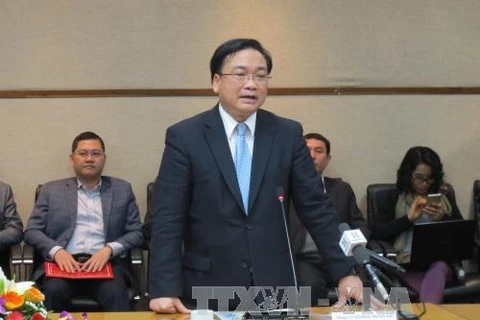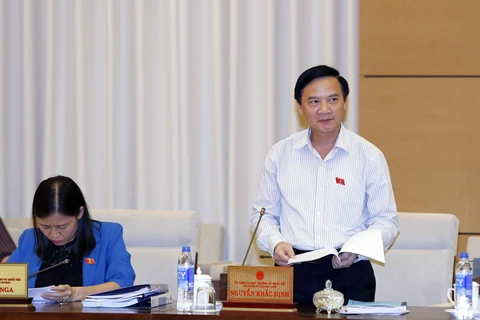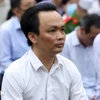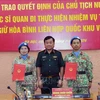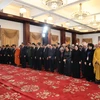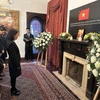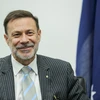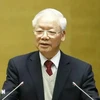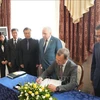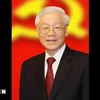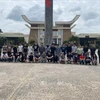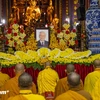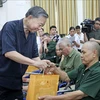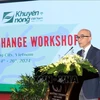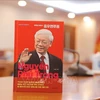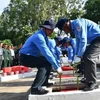 Francesco Checchi (left), Anti-Corruption Regional Advisor, UNODC in South East Asia and Pacific; Nguyen Huu Loc (middle), Acting General Director of the International Cooperation Department under the Government Inspectorate (GI), and Ngo Manh Hung, Deputy Director of Vietnam’s Anti-Corruption Bureau, answer questions by conference delegates. (Photo: courtesy of the GI)
Francesco Checchi (left), Anti-Corruption Regional Advisor, UNODC in South East Asia and Pacific; Nguyen Huu Loc (middle), Acting General Director of the International Cooperation Department under the Government Inspectorate (GI), and Ngo Manh Hung, Deputy Director of Vietnam’s Anti-Corruption Bureau, answer questions by conference delegates. (Photo: courtesy of the GI) Hanoi (VNA) - In the last ten years, a meagre 10 percent of assets worth of 60 trillion VND (approximately 2.65 billion USD) involved in nearly 1,900 corruption cases have been recovered.
The figure was revealed on December 8 by Ngo Manh Hung, Deputy Director of the Vietnam Anti-Corruption Bureau under the Government Inspectorate (GI), at the Multi-Stakeholder Roundtable on the Second Review Cycle of the United Nations Convention Against Corruption (UNCAC), co-hosted by GI and the United Nations Office on Drugs and Crimes (UNODC).
According to Hung, thanks to enhanced efforts, asset recovery has progressively improved but has yet to yield satisfactory outcomes due to the infrequent monitoring of public servants’ assets. As a result, corruption is usually discovered and prosecuted only when the damage is serious.
“Total recovery is hard, and the longer we hesitate, the more amount is irrecoverable,” he said.
Shervin Majlessi, Senior Legal Adviser to the World Bank on the Stolen Asset Recovery Initiative (StAR), agreed with Hùng that assets should be frozen before corrupt officials have time to hide or spend it.
Shervin also advocated co-operation mechanisms between domestic and foreign jurisdictions, stressing mutual legal assistance between states as a key instrument in asset recovery.
Vietnam is looking to consolidate a code of conduct and responsibilities of public servants, and to add regulations on integrity education, Hung said.
The 2015 Vietnam Provincial Governance and Public Administration Performance Index (PAPI) survey, supported by the UN, showed that Vietnamese express more concern about corruption in the public sector and in public service delivery and are more worried about corruption and nepotism in public sector employment. In addition, only 37 percent of citizens say their local government is serious about fighting corruption.
“Putting an end to corruption requires a comprehensive approach. Only in a climate of transparency and accountability and with participation by all members of society is this possible. Governments, the private sector, the media, civil society organisations and the general public need to work together to curb this crime,” said Francesco Checchi, the UNODC Anti-Corruption Regional Advisor in South East Asia and Pacific.
The UN Convention Against Corruption (UNCAC) is the only legally binding universal anti-corruption instrument, and Checchi commended Vietnam for ratifying it in 2009 which has given new impetus to anti-corruption efforts.
In the conference, delegates focused on discussing and sharing information on preparation works for Vietnam’s implementation of the second review cycle of UNCAC, which lasts from 2016 to 2010 and deals with Chapter II on corruption preventive measures and Chapter V on asset recovery; while the first cycle from 2010 to 2015 dealt with Chapter III on criminalisation and law enforcement, and Chapter IV on international co-operation.
"The round table conference is timely and important in the context of that Việt Nam is preparing to construct the UNCAC Second Review Process Report and meanwhile implement four processes of UNCAC," Nguyen Huu Loc, Acting General Director of International Co-operation Department, under GI, said.
The conference was held to mark the 2016 International Day against Corruption (December 9), with this year’s theme being United Against Corruption for Development, Peace, and Security.-VNA
VNA
